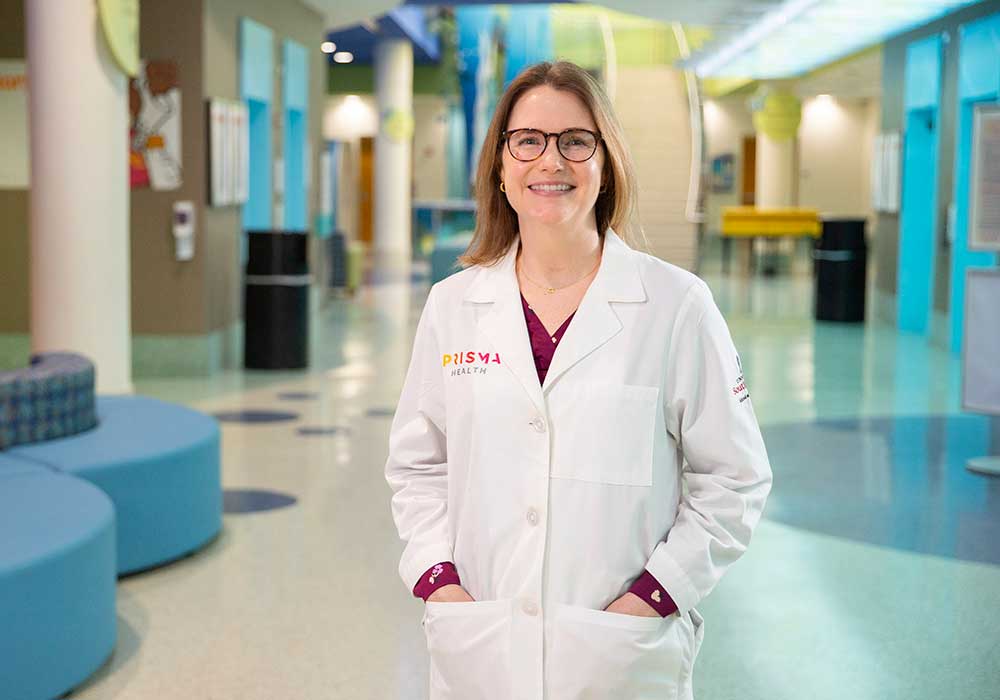Anna Hoppmann was walking through the hospital ward where she was being trained as a pediatric oncologist when a young child called out to her in an urgent voice.
She recognized him as a recently admitted patient and took off running toward his room, anticipating some kind of medical emergency.
But the boy who had been admitted with a life-threatening cancer diagnosis didn’t in that moment need her medical attention. He wanted her personal attention.
“He had taken all of the different plastic bins you can find in a hospital and set up his own candy store for the hospital staff, full of M&Ms and gummy worms,” Hoppmann recalled with a smile. “To him, it kind of was an emergency — the candy store was open with no customers.
“The patients under our care are children all the way through very challenging circumstances. To get to know them and help them through that journey is what I wanted to do.”
Hoppmann is a pediatric oncologist with Prisma Health and a clinical assistant professor at the University of South Carolina School of Medicine Columbia where she graduated nine years ago. She also chairs the S.C. Childhood Cancer Taskforce, which has recently released a 25-year trend report on childhood cancer incidence, survival and mortality in South Carolina. She credits the teamwork of many stakeholders with producing the state’s inaugural childhood cancer report, including the mentorship of cancer epidemiologist and department chair Dr. Tony Alberg from USC’s Arnold School of Public Health.
“The taskforce worked together across disciplines to fully understand the burden and trajectory of childhood cancer in South Carolina over time, and we hope this will lay a foundation to build on for years to come,” she says, adding that many partners and experts across the university, state health systems and beyond applied their expertise to produce the report.
Hoppmann isn’t someone who grew up always knowing she would become a physician and scientist, though she did know she wanted a job where she could help others.
“I saw the impact of my parents’ jobs, my dad as a nuclear safety engineer and my mom as a teacher. I knew they were passionate about their work, and I could tell even as a child that they were making a difference,” she says. “Several times, my mother’s students stopped us while we were running errands around town and told me kind things my mom had done for them along the way. I didn’t know exactly what I would become but knew I wanted to help others like my parents.”
The idea of medicine as an actual vocation took shape during high school when her father, a nuclear engineer at Oak Ridge National Laboratory, was diagnosed with lymphoma. Richard Handley underwent treatment and lived long enough to see his daughter get an academic scholarship to attend the South Carolina Honors College at the University of South Carolina, but he passed away while she was still a teenager.
“That was my first experience with oncology and cancer treatment, and I saw how much he was affected by his doctors. I thought maybe that was something that I wanted to pursue,” she says. “He was really proud of me and so was my mom that I got a scholarship to USC, a place where I felt comfortable and at home.”
In USC’s Honors College, Hoppmann thrived as an anthropology major, minoring in comparative religious studies and winning an undergraduate research award.
“I had a very good mentor in the anthropology department, Prof. Ann Kingsolver, and we did research as a team on understanding barriers to medical interpretation services for Spanish-speaking patients at the Free Medical Clinic and other clinics and hospitals in Columbia,” she says. “That was a formative experience, seeing how you can work together and use research to help others.”

She headed to Emory University in Atlanta to earn a master’s in public health, then returned to Columbia for medical school at USC. “I knew the School of Medicine would be a great fit for my training,” Hoppmann says. “Their mission to train physicians to care for the residents of South Carolina was something that really resonated with me.”
She met her husband, Nicholas, as undergraduates on the historic Horseshoe while they were both students in the USC Honors College. The Hoppmanns now have three children, age six and under, who have brought energy and joy to the household but also a poignant perspective for Anna in her clinical practice.
“As a parent myself, I became more compassionate to parents of my patients, but it also became harder to care for children facing cancer,” she says. “I try to be mentally and physically present for my own kids. I don’t take any day for granted.”
There are many wins for Hoppmann and her colleagues on the pediatric oncology team at Prisma Health — research in the past 40 years has dramatically improved outcomes for many childhood cancers — but not every treatment is successful.
“When it’s time to have a difficult conversation with a parent, I think through how to talk about the prognosis or the path ahead. That's not a conversation you want to rush,” she says. “I had a child in my fellowship training who initially responded well to treatment and then the cancer progressed and became incurable. His mom said to me, ‘Mom to mom, I need you to tell me what's going on.’ And I told her directly that her child was dying, that despite our best efforts, his cancer was growing.
“It was really a hard conversation, but it allowed her to think through what she wanted the coming days and weeks to look like for her child, and she was able to plan that with us. It gave her, I hope, some peace to think through her wishes for her child in advance.”
With major funding from St. Baldrick’s Foundation and Hyundai Hope on Wheels, Hoppmann is researching why not all children have benefited equally from the great gains in pediatric oncology over time. She highlights how the mentorship of Dr. Smita Bhatia, director of the Institute for Cancer Outcomes and Survivorship at the University of Alabama at Birmingham, taught her how to turn clinical observations into research questions to try to improve the field for all patients.
“I look at social determinants of health, things like access to health care, the socioeconomic status of the neighborhood or environment where children diagnosed with cancer grow up and try to determine how those things affect their survival over time,” she says.
“In my field, there are many good days, but there are incredibly hard ones as well. I am part of a great team of doctors, advanced practice providers, nurses and staff that genuinely all want to do the right thing for these children and their families."
Of course, Hoppmann has way more on her plate than when she was an undergrad. On any given day, she’s making rounds with USC School of Medicine students and Prisma Health residents, providing care for a full complement of pediatric patients, conducting research on the health disparities of childhood cancer and co-parenting three young children. But there is always time for what’s most important with her team.
“In my field, there are many good days, but there are incredibly hard ones as well. I am part of a great team of doctors, advanced practice providers, nurses and staff that genuinely all want to do the right thing for these children and their families. And we get through the good and the bad days together,” she says.
“We recently got to celebrate and ring the bell with a patient who completed her cancer treatment and is in remission. We clapped and sang a song for her in the clinic. And her whole family was there — her mom, her siblings, her dad, extended relatives. It had been a hard case and a harder road and just to be there together and celebrate as a team was really special.”
